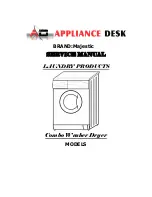
Page 10
PREPARING THE LAUNDRY
With proper attention to how you prepare your laundry
items for washing and drying, your wardrobe and linens
will look like new for years.
SORTING THE LAUNDRY
For best drying results, clothes should be sorted properly.
Most importantly, you should follow the care label
instructions (see next page).
Below are some suggestions on how to sort your laundry
for drying.
♦
Permanent press items should be dried together. For
the most wrinkle-free results when drying permanent
press items, you should fill the machine only half
full. These items also should be removed promptly
from the dryer and hung up or folded right away.
♦
Dry heavy fabrics together and lightweight fabrics
together.
♦
Dry fabrics that shed lint (chenille, terry cloth, etc.)
separately from fabrics that collect lint (synthetics,
velveteen, corduroy, etc.).
♦
Separate non-colorfast fabrics from light-colored
items.
♦
If the care label says "Wash Separately," the fabric
is likely to lose color (excess dye) for the first few
washings. To minimize the possibility of the dye
transferring to white or lighter colored items, dry new
colored garments with items of similar color or alone.
Bright reds and oranges on cottons are the dyes most
likely to transfer colors.
NOTE:
Refer to “Important Safety Instructions” on page
2 for a list of specific materials that should never
be put in a tumble dryer.
FABRIC SOFTENER SHEETS
We recommend that you do not use fabric softener
sheets in the dryer. Over time, the chemicals on these
sheets can build up inside the lint filter and clog the
holes that circulate the air.
DRYING TIMES
Drying times will vary due to the amount of laundry in
the machine, moisture content, type of fabric, air
temperature and humidity. The length of the vent hose
can also affect drying times. (See “Connecting to a
Ventilation Duct” on page 5 for the recommended
installation.)
GENERAL LAUNDRY ADVICE
♦
Read all recommended care labels carefully. If the
care label says “Drip dry,” “Line dry” or Dry flat,” do
not dry that item in the dryer. Certain fabrics will
melt or become dangerously flammable if heated,
while others may lose their shape.
♦
Remove any sharp ornaments, pins or buckles to
prevent snags.
♦
Empty pockets and turn them inside out.
♦
Close zippers and hooks to prevent snagging.
♦
Tie sashes and strings to prevent tangling.
♦
Mend any small rips to prevent them from enlarging.
♦
Turn colored cotton garments, velvet and finer
knitwear inside out before washing.
♦
Turn delicate items, sweaters and T-shirts inside out
to prevent pilling and to protect the prints.
♦
Prewash severely soiled items.
♦
Wash and dry colored fabrics separately the first
time.
♦
Thoroughly rinse down items, such as comforters
(Super rinse).
♦
Use fabric softener to eliminate static electricity in
synthetic garments and to soften cotton.
Different fabrics require different load sizes and drying
temperatures. The table below gives recommended
*
Always refer to the care label on the garment to determine if it can be tumble dried. (See
page 11.) Some wool and silk and hand-washable items should not be tumble dried.
These items should be removed from the washer then pressed out in a terry towel to
remove excess water before being hung up or laid flat to dry.
RECOMMENDED TEMPERATURE SETTINGS AND LOAD SIZES
Temp
Load
Fabric TypeSe
tting
Size
Cotton w/out elastic and/or decorative trim
Normal
Full
Linen – white and colorfast
Normal
Half
Cotton/polyester blends
Low
Half
Polyester/acrylic blends
Low
Half
Rayon and acetate
Low
Half
Washable silk and nylon *
Low
Third
temperature settings and load sizes for different fabrics.











































